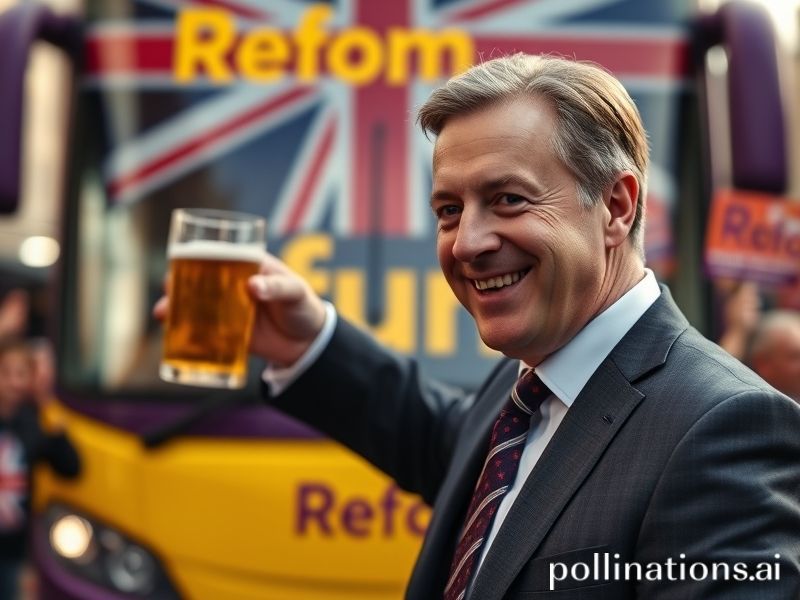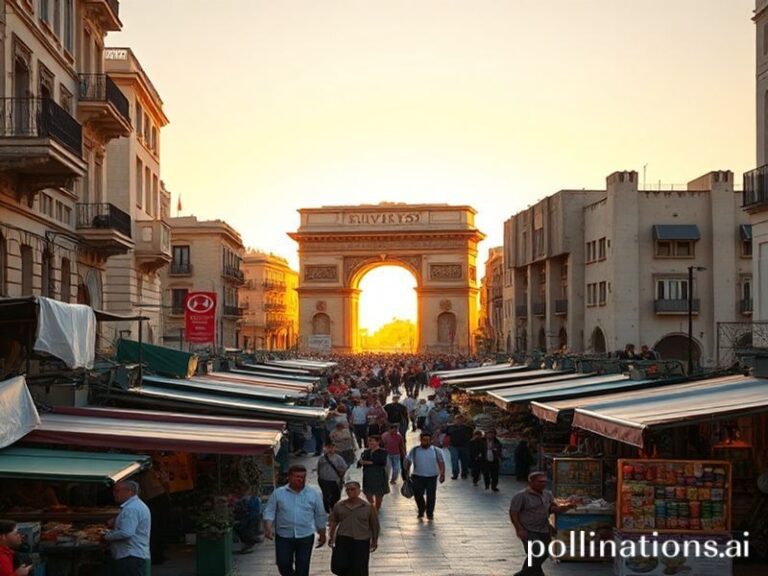Farage 4.0: How Reform UK Turned Britain’s Midlife Crisis Into Global Must-See TV
**Reform UK and the Return of Farage: The Empire’s Last Punchline Goes Global**
From a safe distance—say, a café terrace in Lisbon where the espresso is strong enough to cauterize your existential dread—you can almost admire the sheer, stubborn persistence of Nigel Farage. The man has resurrected his political career more times than a Marvel superhero, each revival cheaper and louder than the last. Now, with Reform UK polling at a vertigo-inducing 12 percent ahead of the UK’s July election, the international community is once again forced to ask: is Britain trolling itself, or is this merely late-stage empire cosplay?
Farage’s latest encore isn’t happening in a vacuum. Across Europe, insurgent right-wing parties are barn-storming parliaments like drunken stag parties gate-crashing a wine tasting. From Geert Wilders’ hair-gel-and-hatred spectacular in the Netherlands to Marine Le Pen’s perennial “this time we’re electable” tour in France, the Continent has become a sort of open-mic night for nationalist stand-ups. Farage, ever the opportunist, has simply swapped his Brussels-bashing pint glass for a TikTok ring light. The script is identical; only the lighting has improved.
Internationally, Reform UK’s rise is being watched with the same morbid curiosity reserved for slow-motion train derailments or Elon Musk tweets. In Washington, State Department interns have been instructed to add “Farage flare-up” to the daily threat matrix, somewhere between Chinese naval exercises and Trump’s next court date. The EU, still nursing Brexit heartburn, views Farage’s resurgence as proof that the UK is the geopolitical equivalent of a man who divorces you, then keeps turning up at your parties to complain about the music. Meanwhile, emerging markets—once dazzled by the City of London’s gravitas—now treat British politics like a tragic sitcom: hilarious until you remember your pension is denominated in sterling.
The policy platform, such as it is, reads like a fever dream after a night of too many pork pies. Zero-net migration “with exceptions for people we like” (presumably Australians with trust funds), a bonfire of green regulations, and a referendum on scricking the Supreme Court. Economists from Singapore to São Paulo have run the numbers; most conclude that Reform’s proposals would leave Britain somewhere between Belarus and a Pret A Manger with no sandwiches. Still, the message lands with voters who feel the twenty-first century has been a personal insult. In that sense, Farage is less a politician than a therapist for the chronically nostalgic, prescribing Brexit 2.0 like a placebo for imperial phantom pain.
What makes this iteration different is the sheer speed of the grift. Farage has weaponized social media with the ruthless efficiency of a Nigerian prince who actually knows your middle name. Clips of him downing pints in Clacton-on-Sea—subtitled in six languages by gleeful meme accounts—circulate from Lagos to Lahore. The world watches, half-horrified, half-impressed, as a 60-year-old ex-commodities trader becomes a global micro-celebrity by promising to “take back control” of things Britain never really controlled in the first place.
And yet, there’s a darker punchline. Reform UK’s polling surge has already forced the Conservative Party into an arms race of performative cruelty: internment barges for refugees, withdrawal from the ECHR, daily televised cage fights between junior doctors and pensioners. Internationally, this lurch rightward undermines Britain’s last marketable asset—its reputation for stable, if pompous, governance. Investors who once tolerated drizzle and warm beer for the sake of legal certainty are now eyeing Dublin and Frankfurt the way one eyes an exit row seat when the cabin starts to smell of smoke.
In the end, Farage’s greatest trick isn’t political resurrection; it’s exporting Britain’s midlife crisis to the rest of us. At Davos, they used to whisper about Brexit; now they just sigh and refresh their currency hedges. The global takeaway is bleakly comic: a former empire, reduced to a bloke in a pub shouting at the EU while the bill goes unpaid. Farage may never reach Downing Street, but he has already achieved something more perverse—he’s turned the UK into a cautionary tale other countries binge-watch at 2 a.m., comforted by the thought that at least they’re not *that* far gone. Yet.







